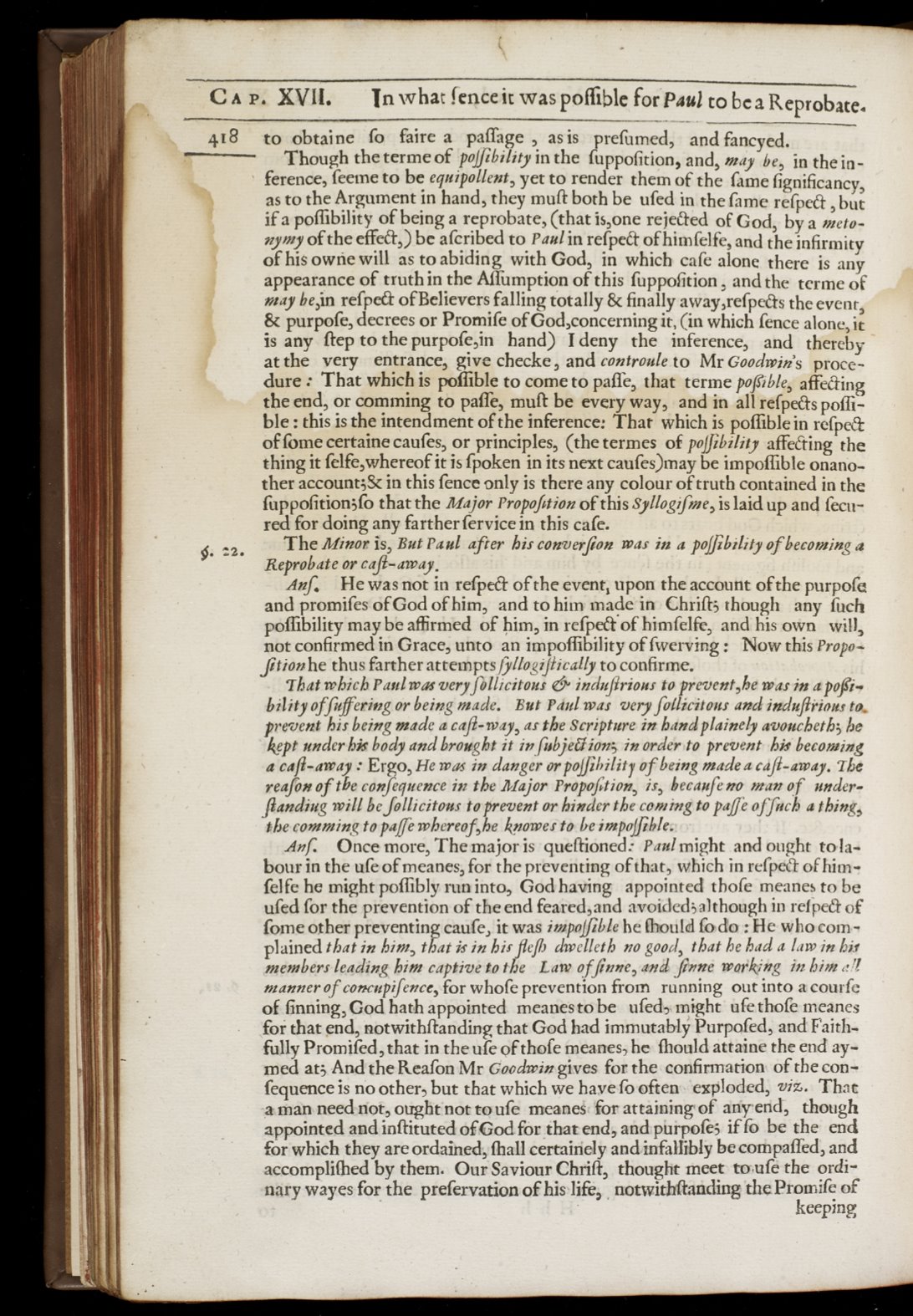

CAP.
XVII.
In
what
fence it
was
poffible
for
Nut
to
be
a
Reprobate.
4(8 to
obtaine
fo
faire
a
pafàge
,
as
is
prefumed, and fancyed.
Though the terme
of
pofbility
in
the
fuppofition, and
may be, in
the in-
ferente,
feeme
to
be
equipollent,
yet
to
render them
of the
fame
fignificancy,
as
to theArgument
in
hand,
they
muff
both be
ufed
in
the
fame refpe&,
but
if
a
pofíibility
of
being
a
reprobate,
(that
is,one reje
&ed
of God,
by
a meto-
nymy
of
the
effe
&,) be afcribed
to
Paulin refpe&
ofhimfelfe,
and
the
infirmity
of
his
owrie will
as
to
abiding with God,
in which cafe
alone
there
is
any
appearance
of
truth
in
the
Affumption
of
this
fuppofition
,
and the
terme
of
may be,in
refpe&
of
Believers
falling
totally
& finally
away,refpe
&s
the
event,
& purpofe, decrees
or
Promife
of
God,concerning
it,
(in
which fence alone,
it
is
any ftep
to
the
purpofe,in
hand)
I deny
the
inference, and thereby
at
the very entrance,
give
checke, and
controule
to
MrGoodwin's
proce-
dure
:
That
which
is
poffible
to
come
to
paffe,
that terme
pofible, affe&ing
the
end, or comming
to
paffe,
muff:
be
every way,
and in all
refpe&s
poffi-
ble
:
this
is
the intendment
of
the
inference:
That
which
is
poffible
in refpe&
offome
certaine
caufes,
or
principles,
(the
termes
of
pofJìbility
affe&ing
the
thing it
felfe,whereof
it
is
fpoken in its
next
caufes)maybe impoflible onano-
ther
account;&
in this fence only
is
there
any
colour
of
truth
contained
in
the
fuppofition ;fo
that
the
Major
Propofition
of
this
Syllogifine,
is
laid up and
feat-
red
for doing
any
fartherfervice
in this
cafe.
4
2
The
Minot
is,
But
Paul
after
his
converfion was
in a
pojbility
of
becoming
a
Reprobate or
cajt-away,
Anf.
He
was
not
in refpe&
of
the
event, upon
the
account
of
the purpofe
and promifes
ofGod of
him,
and to
him
made
in
Chrift; though
any fuch
poffibility may
be
affirmed
of
him,
in refpe&
of
himfelfe, and
his
own
will,
not
confirmed
in
Grace,
unto
an impoffibility
of
fwerving
:
Now
this
Propo-
f
tionhe thus
farther attempts
fyllogijticaly
to
confirme.
That
which Paul
was
very
follicitous
&
induftrious
to
prevent,he
was
in
a
poßi-
bility
offujfering or
being made. But
Paul
was very
follicitous
and
indufirious ta.
prevent
his beingmade a
caft
-way, as the Scripture
in hand
plainly
avoucheth;
he
kept
under
his
body
and
brought
it
in
fubjeelion;.
in
order
to
prevent
his
becoming
a call-away
: Ergo,
He was
in
danger
or
poJhility
of
being
made a caft-away.
The
reefer/
of
the confequence
in
the
Major
Propofition,
is,
beca
ufeno
man
of
under-
flandiug will
be
felicitous
to
prevent or hinder
the coming
to paffe
offuch
a
thing,
the
comming to paffe whereof,he knowerto
be
impof
hie.
Anf.
Once
more,
The major
is
queffioned:
Paul
might and ought
tola-
bour
in
the
ufe
of
meanes, for
the preventing
of
that,
which in
refpe&
of
him-
felfe he
might poflibly run
into, God
having appointed thofe
meanes
to
be
ufed for the prevention
of
the
end feared,
and
avoided; although
in
refpe&
of
forne
other preventing
caufe,
it
was
impojfihle
he
Should
fordo He
who
cow-,
plained that
in him,
that
is
in
his
fief',
dwelleth
no good,
that
he
had
a law
in
his
members
leading him captive
tote
Law
alpine,
and
finase
working
in
him
al
manner
of
concupifence,
for whole prevention from running out into
a
courfe
of
finning,
God hath appointed
meanes
to
be
tiled,
might
ufe
thofe meanes
for that
end, notwithftanding
that
God had immutablyPurpofed, and Faith-
fully
Promifed,that
in
the
ufe
of
thofe meanes,
he
fhould attaine the end
ay-
med
at;
And
the
Reafon Mr
Goodwin
gives
for
the
confirmation
of
the
con-
fequence
is
no
other, but that
which
we
have
fo
often
exploded,
viz.
That
a
man
need
not, ought
not
to
ufe meanes
for
attaining
of
anyend,
though
appointed and inftituted
ofGod
for
that
end, and purpofe;
if
fo
be
the end
for
which
they
are ordained,
(hall
certainely
and
infallibly be compaffed,
and
accomplifbed by them.
Our
Saviour Chrift,
thought
meet
mute
the ordi-
nary
wayes for
the
prefervation
of
his life,
notwithítanding
thePromife
of
keeping










